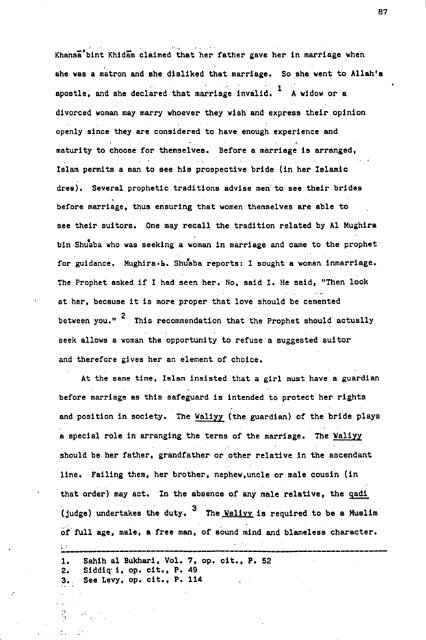Download - University of Salford Institutional Repository
Download - University of Salford Institutional Repository
Download - University of Salford Institutional Repository
Create successful ePaper yourself
Turn your PDF publications into a flip-book with our unique Google optimized e-Paper software.
Khansiobint khidZn claimed that her father gave her in marriage when<br />
she was a matron and she disliked that marriage. So she went to Allah's<br />
apostle, and she declared that marriage invalid. A widow or a<br />
divorced woman may marry whoever they wish and express their opinion<br />
openly since they are considered to have enough experience and<br />
maturity to Choose for themselves. Before a marriage is arranged,<br />
Islam permits a man to see his prospective bride (in her Islamic<br />
dres). Several prophetic traditions advise men to see their brides<br />
before marriage, thus ensuring that women themselves are able to<br />
see their suitors. One may recall the tradition related by Al Mughira<br />
bin Shuaba who was seeking a woman in marriage and came to the prophet<br />
for guidance. Mughirash. Shuaba reports: I sought a woman inmarriage.<br />
The Prophet asked if I had seen her. No. said I. He said, "Then look<br />
at her, because it is more proper that love should be cemented<br />
2<br />
between you. " This recommendation that the Prophet should actually<br />
seek allows a woman the opportunity to refuse a suggested suitor<br />
and therefore gives her an element <strong>of</strong> choice.<br />
At the same time, Islam insisted that a girl must have a guardian<br />
before marriage as this safeguard is intended to protect her rights<br />
and position in society. The Waliyy (the guardian) <strong>of</strong> the bride plays<br />
a special role in arranging the terms <strong>of</strong> the marriage. The Waliyy<br />
should be her father. grandfather or other relative in the ascendant<br />
line. Failing them, her brother, nephew, uncle or male cousin (in<br />
that order) may act. In the absence <strong>of</strong> any male relative, the qadi<br />
3<br />
(judge) undertakes the duty. The Waliyy is required to be a Muslim<br />
<strong>of</strong> full age, male, a free man. <strong>of</strong> sound mind and blameless character.<br />
1.<br />
2.<br />
3,<br />
Sahih al<br />
Siddicr. i,<br />
See Levy,<br />
Bukhari, Vol.<br />
op. cit.,<br />
op. cit.,<br />
P.<br />
P.<br />
7. op. cit.. P. 52<br />
49<br />
114<br />
87
















